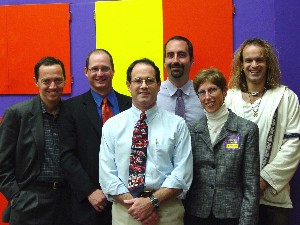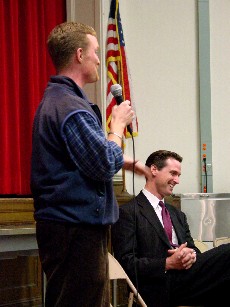
District 8 Supervisor candidates, from left to right: Bevan Dufty, Shawn O'Hearn, James Green, Tom Radulovich, Elaine Hansen, Starchild. (Photo by Eric Wagner)
October 25, 2002
Instead of watching the Giants game on the chilly evening of October 9th, some 70 residents spent two hours sitting on folding chairs in the Alvarado Elementary School cafeteria. The cafeteria, decorated with handmade posters and strewn with leftover crumbs from lunchtime, was turned into a makeshift auditorium for Noe Valley Candidates and Issues Night, sponsored by Friends of Noe Valley (FNV) and four other neighborhood groups.
The audience, comprising residents with a keen interest in local politics,
watched a sextet of candidates vie for the District 8 seat on the San Francisco
Board of Supervisors. (District 8 includes Noe Valley, the Castro, and surrounding
areas. Current District 8 Supervisor Mark Leno is leaving the position to run
for California State Assembly.) This race is "the most closely watched,"
according to FNV president Jeannene Przyblyski, "because who we choose
will impact the Board of Supervisors and the city as a whole."
 |
|
District 8 Supervisor candidates, from left to right: Bevan Dufty, Shawn O'Hearn, James Green, Tom Radulovich, Elaine Hansen, Starchild. (Photo by Eric Wagner) |
All six District 8 Supervisor candidates -- Bevan Dufty, James Green, Eileen Hansen, Shawn O'Hearn, Tom Radulovich, and Starchild -- made five-minute presentations and fielded questions from the audience. Below, in alphabetical order, are the highlights and main points of each presentation.
Bevan Dufty served as Director of the Mayor's Office of Neighborhood Services from 1996 to 2001. His eye-catching logo -- a blue cartoonish man with a television head -- can be spotted in some residential windows. During his presentation, Dufty stated that, because of his background in city service, he "understands how the city works, or doesn't work." He feels he has "the knowledge, experience, energy, and passion to be an effective leader for District 8" and "bring departments together and improve neighborhoods on a block-by-block basis." He plans to work with public schools, because "we don't want a second-class public education system." He's also "bullish" on the Care Not Cash initiative (Proposition N), as he feels strongly that "changing the city's approach to homelessness is the key issue facing San Francisco." (BevanDufty.com)
James Green's black tie with red fire engines illustrated his pride in his well-rounded public service career; currently a firefighter and paramedic, he's formerly served as police officer, nurse, and teacher. As part of his career, he has dealt directly with homeless people, and supports Prop. N. At the start of his speech, he displayed a large handwritten placard outlining the data backing his endorsements. He objects to dangerous panhandling, especially in traffic, and advocates a 1/2-cent alcohol tax (to generate $5 million for detox programs), a short-term detox clinic, and a 24-hour mental health clinic. He believes that DAPTS (a public service term for "drugs, alcohol, or psychiatric treatment street people") who are arrested for public drunkenness or drug use should be dropped from cash support and switched to service vouchers. (415-282-0927 or JGreenDistrict8@hotmail.com)
Eileen Hansen, the only female candidate, is hopeful about winning, having lost to Mark Leno by only 712 votes two years ago. She's proud of her community mediation background and three decades of public service, but concerned about the direction of the city administration and "runaway development and lost diversity" during the economic boom. She believes San Francisco should be "affordable and livable" for everyone, including nonprofits, renters, artists, families, seniors, and people of color. "I live here because I don't want to live in Utah or Kansas," she said. "There's a uniqueness here." She advocates long-range planning -- for both boom and bust economies -- specifically, prioritizing city needs and setting a budget accordingly. She opposes Prop. N, and instead supports instituting the Continuum of Care plan, developed by over 200 community experts, which provides substance abuse treatment, mental health services, job training, and transitional housing: "It's a finished plan, but it's been on the shelf." (EileenHansenSF8.info)
Shawn O'Hearn, member of San Francisco's Democratic County Central Committee, believes that "the leadership is missing in the districts," especially with independent district elections. He feels a supervisor should be accessible to the public after -- not just before -- an election, and therefore supports a District Constituency Office as a place to gather information. "There's a club for every group imaginable in San Francisco, which is good," he said, and advocates, therefore, a neighborhood council that gets together once a month, like an "input meeting," to discuss and resolve issues between the groups. He also supports spending a small amount of the $5 million budget -- "say, $100 thousand" -- for neighborhood improvements. (OHearn4Supervisor.com)
Tom Radulovich, endorsed by incumbent Supervisor Mark Leno, is active in the Noe Valley Democratic Club and SPUR (San Francisco Planning and Urban Research Association). Because he believes that quality of life is not district-specific, he advocates city-wide improvements: better transit (he's served on the BART board for six years) and long-term solutions to homelessness, such as permanent housing. He feels city planning has deteriorated, and believes he, like Leno, bridges the gap between Supervisor Tom Ammiano and Mayor Willie Brown, but sides with neither on "untested" homelessness Props N and O. "The key issue is livability," he said, regarding streets, transit, parks, and neighborhoods. He plans to update BART facilities, install new ticket machines, and implement a plaza plan for the 24th and Mission station, and said a new BART station at 30th and Mission Streets, the "greatest gap between BART stations," would revitalize the South-of-Chavez community. (TomRadulovich.com)
Starchild, an exotic dancer and escort, was perhaps the sexiest and hippest-looking candidate at the event, sporting a bohemian canvas jacket, form-fitting pants, and long windblown hair. As the only Libertarian candidate, he called the overwhelmingly Democratic San Francisco a "one-party town." He believes Democrats misspend money and plans to "get power back to you." He rebuked local government workers who earn six-figure salaries and "huge amounts of overtime" and opposes Proposition J, which increases Supervisor salaries from about $37.5 thousand to $88 thousand: "I won't raise my own salary at your expense." He supports civil liberties for everyone, including homeless people, who he feels have the right to sleep in their vehicles (currently prohibited by law) instead of on the streets. "I don't support the city being cruel to the homeless," he said. (Libertarian Party of California: www.ca.lp.org)
The candidates then passed the mic back and forth to discuss Noe Valley neighborhood planning, affordable housing, and dog and park policies. Highlights included Green's suggestion that park planners should grow hedges -- as in France -- instead of erecting "penal Gothic architecture" chain-link fences to separate dog runs from other areas, and Starchild's childhood anecdote -- his third-grade teacher kept everyone after school because a few kids had thrown spitballs. (Starchild's anecdote exemplified the importance of the "individual responsibility" core of his Libertarian philosophy: just as the entire class should not have been detained because of the poor behavior of a few kids, the majority of dog owners should not be punished for the actions of a few irresponsible ones.)
Several candidates were stumped by this savvy question: "What have you done for Noe Valley lately?" Green, O'Hearn, and Starchild were honest about doing nothing. Green, however, continues to stay educated by attending local meetings, and Starchild, in keeping with his Libertarian philosophy, promised to "leave Noe Valley alone." Dufty worked with local merchants to combat the acid-etching window vandalism; he wants to implement a reward system to catch the perpetrators. Hansen facilitated meetings between builders and neighbors to negotiate differences outside the Planning Commission.
Przyblyski, who moderated the event, was impressed with the presentations. "It was one of the livelier and more agreeable evenings that District 8 has seen," she said. "Seeing the supervisorial candidates up close and personal is one of the direct benefits of district elections."
After the candidates' presentations and discussions, the audience heard arguments
for and against 4 of the 20 San Francisco propositions on the November 5th ballot.
Jennifer Webber, campaign manager for Prop. A (Hetch Hetchy Repair and Upgrade Revenue Bond), said Prop. A is necessary for repairs and earthquake management and that water rates won't increase for low-income residents and seniors. Sierra Club member Caleb Kleppner countered that it's a step backwards: Congress had given Hetch Hetchy to San Francisco, but this proposition returns the authority to the state. In addition, Kleppner said the bond doesn't cover seismic retrofitting; however, residents will pay higher water rates to cover a "massive expansion" of the system. (SaveHetchHetchy.com, NoOnPropA.com)
 |
|
|
Supervisor Gavin Newsom enjoys a joke from his opponent on Care Not Cash, community worker Quintin Mecke. (Photo by Eric Wagner) |
The audience greeted Supervisor Gavin Newsom, who spearheaded Prop. N (Care Not Cash Initiative), with warm applause and cheers. In person, Newsom is the embodiment of physical perfection: in a tailored suit and sleek salon-styled hair, he looks like a life-size Ken doll imbued with the spirit of Apollo, shining in all his glory. Obviously a graduate of Toastmasters (and fan of the camera), his compelling speaking style silenced the room. He called the record number of homeless deaths "a disgrace, an outrage, a tragedy," and stated that "no other county gives so much and requires so little." He believes Prop. N will "convert the cash to guaranteed access to service." Community Vocational Enterprises specialist and former mental health worker Quintin Mecke held his own against the charismatic Newsom. Mecke implored, "Accountability without support is a form of cruelty." There are no "guaranteed services" in Care Not Cash, he stated, and the destitute must fight over crucial and underfunded services. He asked the audience to imagine living on under $2 a day, and reminded them that they'll be "directly influencing someone's life" on November 5th. "I find it morally troubling," he added, "for politicians to further their careers on the backs of the homeless." (CareNotCash.org, NoMoreHomelessness.org)
Mecke said Prop. O (Exits from Homeless Ordinance), which requires the departments of Health and Human Services to develop housing, new substance treatment programs, and annual budgets, was created in response to Prop. N. Jim Ross, campaign manager for Prop. N, countered that Prop. O effectively makes Prop. N voluntary (instead of mandatory).
 |
| Philip Grady, a UC Hastings student, debates Prop. R with Scott Weaver, a tenants attorney. (Photo by Eric Wagner) |
UC Hastings Law student Philip Grady, a renter, supports Prop. R ("HOPE" -- Home Ownership Program for Everyone): "The number one reason people leave San Francisco is lack of affordable homeownership." Scott Weaver, an attorney who's worked in tenants rights and homeownership counseling since 1976, argued that under HOPE, few tenants will become homeowners because condos still won't be affordable to them (average selling price is $500 thousand in San Francisco, higher in Noe Valley) and, worse, are not protected from Ellis Act and owner move-in evictions, effectively repealing rent control. (SFHope.org, SaveRentControl.org)
Perhaps the most important message of the evening was that after becoming informed about the candidates and issues, it's crucial that residents take their knowledge to the polls and actually vote. A representative from the Department of Elections Voter Outreach Program invited everyone to participate in the democratic process, by both voting and becoming much-needed poll workers. He reminded the audience to make sure their voting paperwork is in order: changes in name, location, or political affiliation require re-registration. In addition, San Francisco residents can now vote from the comfort of home by registering absentee for life. Voters can find more information online at sfgov.org/election. For links to all the propositions, visit SFPolitics.com.
[Note: This article is the original version. The Noe Valley Voice published, in its November 2002 issue, a rewritten version.]
Copyright © 2002 Mariva H. Aviram. All rights reserved.